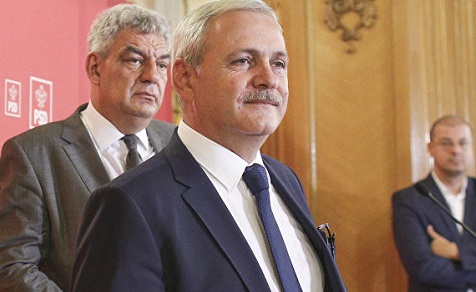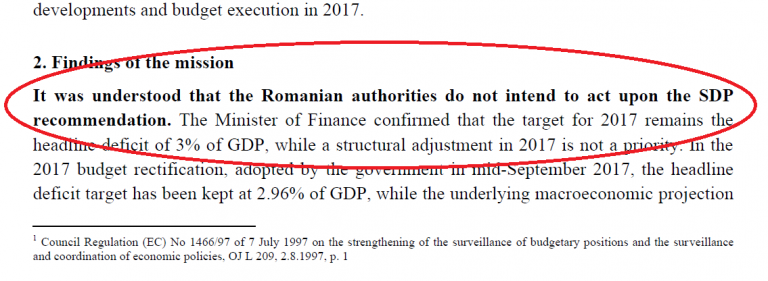 A mission for evaluating Romanian tax policies, which arrived to Bucharest last month, found that the Government does not want to take into account the recommendations that the European Commission made with the launch of the Significant Deviation Procedure. This procedure has been decided in June 2017 because Romania deviated from mid-term budgetary objectives (MTO).
A mission for evaluating Romanian tax policies, which arrived to Bucharest last month, found that the Government does not want to take into account the recommendations that the European Commission made with the launch of the Significant Deviation Procedure. This procedure has been decided in June 2017 because Romania deviated from mid-term budgetary objectives (MTO).
The European Commission sent this week to the European Council the report on the mission which, between September 26-27, carried out the evaluation of the tax policies promoted in Bucharest. According to the official report, Minister Ionut Misa and the Government would ignore the balance keeping and consolidation measures suggested by Brussels on the ground that they have been transmitted to Bucharest „too late”.
The evaluation committee has reported on its views on the main measures announced by the Government, which are not favourable to the PSD-ALDE government.
First observation: Romanian authorities do not want to follow European recommendations
The surveillance mission report starts with a clear statement: „It was understood that the Romanian authorities do not intend to act upon the Significant Deviations Procedure recommendations„.
 The report says the message was sent by the Finance Minister Ionut Misa himself, who told the committee members that the target for 2017 remains a deficit of 3% of GDP and that the structural adjustments are not a priority of this year. In addition, the Romanian Minister of Finance explained that the commission’s recommendations came late which limited the domains of applications of these recommendations.
The report says the message was sent by the Finance Minister Ionut Misa himself, who told the committee members that the target for 2017 remains a deficit of 3% of GDP and that the structural adjustments are not a priority of this year. In addition, the Romanian Minister of Finance explained that the commission’s recommendations came late which limited the domains of applications of these recommendations.
Analysing the data from the budget adjustment made in mid-September, which maintain the deficit at 2.96% of GDP despite that the macroeconomic projections are improving, the Commission notes a deterioration in the deficit structure.
Brussels’ opinion: Deficit is impossible to maintain under 3% of GDP in 2018 as well
The Romanian authorities, according to the report, say they want to maintain the same level of deficit in 2018 as well – 3% of GDP. The Ministry of Finance has set two targets for 2018: the primary objective is to maintain the budget deficit at 3% of GDP, the secondary objective is to reduce the structural deficit by 0.5% of GDP.
The mission noted that maintaining the deficit at 3% of GDP in 2018 would entail a deterioration in the structural tax position.
According to the European Commission’s projections, by applying the usual scenario of maintaining the current tax policy, the deficit is very likely to grow substantially in 2018, even over 4% of GDP, because of the future significant increase of wages in the public sector.
The Commission examines some of the measures announced by the Government. Conclusions, in the following:
State still has no solution to compel private sector to raise gross salaries
Authorities intend to transfer social contributions entirely to the employees so that they can mitigate the impact of the Unitary Pay Law. The intention is to increase the contribution rate paid by the employee from the gross salary.
The Government intends to apply at the same time a reduction of these contributions, which currently are 22.75% to the employer and 16.5% to the employee, to 36% applied to the employee and decrease the income tax from 16% to 12% or 10%.
The Government is looking for legal solutions to force private sector employers to raise their employees’ gross wages so that the change in the social contributions to not affect the employee’s net salary.
Stakes of money in Pillar II Pension Funds
The Government is also considering a reversal of the pension reform implemented in 2008, which introduced the second pension pillar. The authorities consider a reduction in the transfer of social contributions to the second pension pillar, which, according to the rules of the European System of Accounts (ESA), is considered outside the public administration. These transfers amount to about 0.8% of the annual GDP.
If this measure were to be adopted, the tax revenue would dissipate in the long run, as social contributions diverging from the second pillar would be accompanied by an obligation to pay the old-age pensions in the future.
In addition, the report says, this change could negatively affect the viability of the pension system and the development of the capital markets.
The mission warned Romanian authorities against adopting such profound changes in the pension system in a precipitous manner, without adequate analysis and just for reasons of decreasing the short-term deficit.
The Commission believes that the nationalization of assets accumulated in Pillar II, which, according to ESA rules, would not affect the public deficit, does not seem to be considered at this moment.
Split VAT controversy: EU says there must be a derogation, Ionut Misa says no
 The mission also discussed the recently adopted mechanism of split VAT payments, approved by an emergency ordinance at the end of August 2017.
The mission also discussed the recently adopted mechanism of split VAT payments, approved by an emergency ordinance at the end of August 2017.
The mission does not analyse the effectiveness of this measure but has told the Government that requiring companies to adopt this system could have been made based on a possible derogation from the VAT Directive.
The Romanian Finance Minister has questioned the need to obtain this derogation and argued that the European Commission’s officials did not have the correct information about this measure.
Concerns confirmed by BNR, Fiscal Council and even specialized parliamentary committees
The National Bank of Romania confirmed the pro-cyclical tax policy, confirming the Commission’s concerns about the current policy mix. Romania is experiencing a period of strong economic growth, an ideal moment for the reconstruction of the tax buffers needed in a potential change of trend.
However, Romania’s fiscal position was extremely expansive. From this perspective, Romania’s tax policy seems imprudent and strongly influences the monetary policies.
The mission also had an exchange of views with the representatives of the specialized committees from the Senate and the Chamber of Deputies. At the meeting, both representatives of the ruling coalition and the opposition shared concerns about the structure of the budget, especially about the cut in the funds for investments and the impact caused to the long-term economic growth. The management of both committees seems to be aware of the need to change the tax policies and start structural adjustments in 2018.
The Fiscal Council shared the Commission’s concerns about the fiscal perspectives. According to the Fiscal Council, the structural deficit will significantly deteriorate in 2018 and in the absence of some compensatory measures, the budget deficit is impossible to maintain below 3% of GDP.
What the committee from Brussels is doing in Bucharest
Romania registered a significant deviation from the mid-term budget objectives (MTO) in 2016 and therefore the European Commission launched in Romania, in spring 2017, the Significant Deviation Procedure (SDP).
Romania’s structural deficit increased to 2.5% of GDP in 2016, from below 1% of GDP in 2015, because of a significant decrease in the indirect taxes and the wage increases in the public sector – measures imposed by PSD and ALDE by parliamentary procedures and accepted by PNL.
Therefore, on May 22, 2017, the European Commission warned Romania and proposed to the Council the launch of the SDP.
Under this procedure, a recommendation has been issued, approved in June 2017, whereby the Council asks Romania to take measures to ensure that the nominal growth rate of primary net public expenditure will not exceed 3.3% in 2017.
This corresponds to an annual structural adjustment of 0.5% of GDP, the minimum effort set by the preventive arm of the Stability and Growth Pact. Specifically, Romania should have applied corrective measures equivalent to 1.8% of GDP in 2017, compared to the baseline in the Commission’s spring economic forecast of 2017.
Romania submitted to the Council, from the Summer to October 15, 2017, a series of reports on the measures taken in response to the Council’s recommendation.
The European Commission is currently examining the content of Romania’s presentation and for this purpose, a committee arrived in Bucharest, which carried out a surveillance mission between September 26-27. The committee members met the Minister of Finance Ionut Misa, BNR Governor Mugur Isarescu, representatives of the Fiscal Council and members of the parliamentary budget-finance committees.
The purpose of the mission was to find out in detail the plans in the tax domain drawn up by the Romanian authorities, present the tax risks resulting from the planned measures to these authorities and encourage them to comply with the provisions of the Stability Pact.









